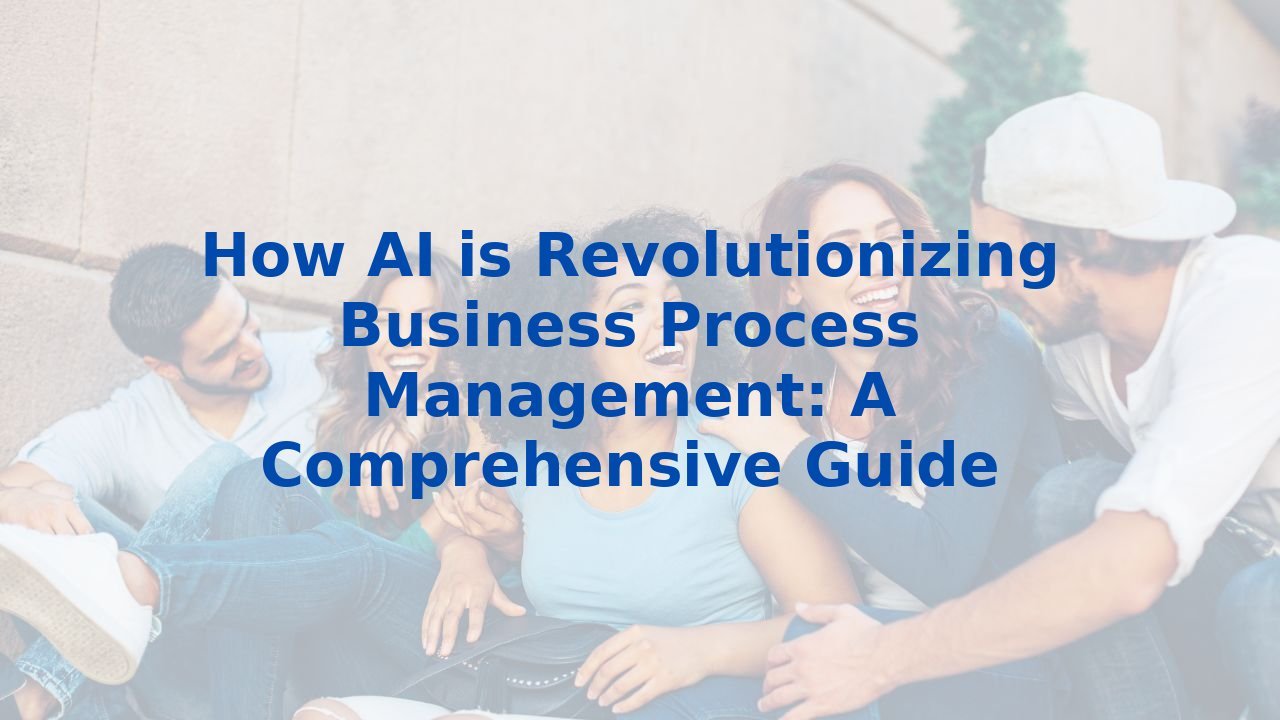How AI Is Revolutionizing Business Process Management: A Comprehensive Guide

How AI Is Revolutionizing Business Process Management: A Comprehensive Guide
The Transformative Role of AI in Business Process Management
In a world where the speed of business is paramount, organizations are constantly on the hunt for ways to boost efficiency, streamline operations, and enhance decision-making. Enter Artificial Intelligence (AI)—a game changer in the realm of Business Process Management (BPM). This guide will take you through the ways AI injects efficiency into various business processes, uncovering its pivotal role in modern organizational management.
Understanding Business Process Management
Business Process Management (BPM) is an essential management discipline that has evolved since its emergence in the late 1980s. It combines systematic analysis and improvement of business processes with the aim of enhancing efficiency, productivity, and quality. BPM encompasses several activities, including process discovery, mapping, automation, and continuous improvement.
How AI Enhances Business Processes
AI is at the forefront of revolutionizing BPM, offering powerful tools and methodologies that analyze, optimize, and automate business processes. Below are key ways AI is making a significant impact:
Process Discovery and Mapping
AI employs techniques such as process mining, pattern recognition, and natural language processing to uncover a company's existing workflows. This capability is essential for developing accurate, up-to-date process maps that serve as a foundation for understanding operational flows. By analyzing vast quantities of operational data, AI reveals inefficiencies that may otherwise remain hidden, facilitating the optimization of operational models and the elimination of bottlenecks.
Process Automation
One of the most notable applications of AI within BPM is process automation. Robotic Process Automation (RPA), enhanced by AI, can seamlessly handle repetitive, rule-based tasks that would typically consume countless hours of human labor. From automating data entry to managing customer service inquiries, AI automation workflows operate 24/7 with remarkable accuracy, freeing human employees to engage in strategic activities.
Real-Time Monitoring and Predictive Analytics
AI's capacity for real-time monitoring empowers organizations with timely insights into their business processes. By continuously analyzing operations, AI can identify potential issues and enable timely interventions. Moreover, predictive analytics, driven by historical data analysis, allows organizations to proactively identify bottlenecks, thereby averting delays and facilitating a more fluid operation flow.
Decision Support and Optimization
In business, informed decisions carry weight. AI enhances decision-making processes by processing structured and unstructured data from various sources, equipping decision-makers with comprehensive insights. By simulating potential scenarios, AI not only provides valuable information but also helps in assessing risks, maximizing efficiency in critical decision-making processes.
Continuous Improvement
AI thrives on feedback loops, promoting a culture of continuous improvement. By offering ongoing insights and data-driven recommendations, organizations can iteratively refine their processes, ensuring alignment with business goals and industry standards over time.
Benefits of AI in Business Process Management
Integrating AI into BPM yields a multitude of benefits, including:
- Improved Efficiency: By automating routine tasks, AI reduces manual effort and errors, allowing teams to focus on high-impact activities.
- Enhanced Decision Making: With AI’s predictive modeling and dynamic adaptability, organizations make informed, data-driven choices.
- Real-Time Monitoring: Continuous process observation permits swift interventions when issues arise.
- Process Optimization: AI uncovers deficiencies within workflows, presenting actionable suggestions to enhance efficiency.
The Importance of Employee Training for AI
As AI continues to reshape business landscapes, it's crucial that employees are equipped to capitalize on these technologies. Here's why training your workforce in AI is essential:
- Understanding AI Tools: Familiarity with AI applications ensures employees can effectively integrate these technologies into their daily tasks, unlocking their full potential.
- Adapting to New Technologies: With the rapid evolution of AI, training promotes adaptability within employees, allowing them to harness new capabilities as they emerge.
- Enhancing Collaboration: When all team members are trained in AI, it fosters a sense of unity and alignment across departments, optimizing the organization's overall effectiveness.
Conclusion
The integration of AI into Business Process Management stands to redefine the operational capabilities of organizations. By heightening process discovery, automation, real-time oversight, and decision-making, AI dramatically increases efficiency and productivity. Coupled with robust employee training, businesses not only realize but also sustain the profound benefits of this technology. As we look to the future, the strategic deployment of AI within BPM will undoubtedly serve as a cornerstone of long-lasting success and competitiveness in an ever-evolving market.